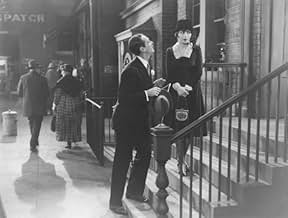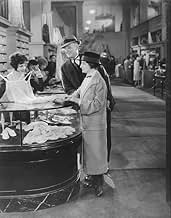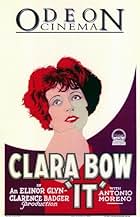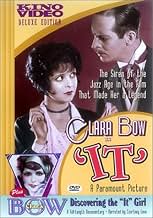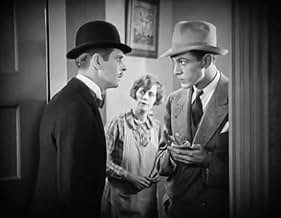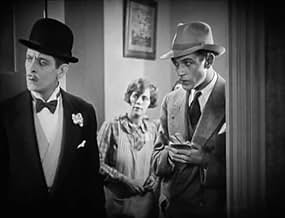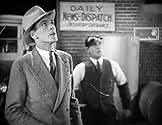IMDb RATING
7.2/10
3.9K
YOUR RATING
A salesgirl pursues a handsome playboy.A salesgirl pursues a handsome playboy.A salesgirl pursues a handsome playboy.
- Awards
- 1 win total
Elinor Glyn
- Madame Elinor Glyn
- (as Madame Elinor Glyn)
Elmo Billings
- Office Boy
- (uncredited)
Gary Cooper
- Newspaper Reporter
- (uncredited)
Lloyd Corrigan
- Yacht Cabin Boy
- (uncredited)
Cheryl Holt
- Baby
- (uncredited)
Eleanor Lawson
- First Welfare Worker
- (uncredited)
Rose Tapley
- Second Welfare Worker
- (uncredited)
Dorothy Tree
- Waltham Employee
- (uncredited)
Featured reviews
If there's any question why Clara Bow became one of the top box office stars of the late silent era, "It" answers that question. The film, perhaps the one with which she will always be associated, is indeed a star turn, but a great one.
Bow,playing a counter girl who wins the heart of the owner of the great department store she works, turns in a memorable performance.
She brings everything you could want to the role, from great comic timing to a very robust physical presence. More than anything, of course, she is incredibly photogenic, a magnetic presence that simply lights up the screen.
Most heartening to me was the very large number of people well under 30 who viewed this film with me the night I saw it. They seemed to absolutely loved it.
Bow,playing a counter girl who wins the heart of the owner of the great department store she works, turns in a memorable performance.
She brings everything you could want to the role, from great comic timing to a very robust physical presence. More than anything, of course, she is incredibly photogenic, a magnetic presence that simply lights up the screen.
Most heartening to me was the very large number of people well under 30 who viewed this film with me the night I saw it. They seemed to absolutely loved it.
When it comes to IT, Clara Bow was in a league of her own. No other actress I've ever seen has even been close(maybe Jean Harlow). But most actresses since Clara didn't have silent films, which allowed her beautiful expressive eyes, facial expressions, and physical gestures (such as looking between the legs of stuffed toy dog) to do her talking and leave no doubt as to her intent. Her ability to do this made her special. I must admit that even though I loved this film, IT isn't my favorite performance by Clara. I happen to think she displayed as much and possibly more "IT" in some of her other silent movies like MANTRAP, HULA, & THE PLASTIC AGE than in IT. If you don't believe that's possible, then I highly recommend checking out some of her other films and judge for yourself. Even if you disagree, you will enjoy these performances if you enjoyed this film. As a whole, I think IT was the strongest of her silent films (in terms of plot, writing, and character development) that I've seen. Regardless, IT is the film for which Clara is most remembered and the favorite of her modern day fans. From Clara's scheming to reel in her boss as a husband to the hilarious sub-titles ("Sweet Santa, give me him", "Hot socks, the new boss", "I'll take the snap out of your garters", "He couldn't give birth to a suspicion", "On the contrary, I think she's got plenty in reserve"), I enjoyed this 1920s romantic comedy tremendously. Could Elinor Glyn, have been trying to promote her book or herself? IT was only defined 3 times during the movie (in the opening credits, in the first scene where Monty is reading about IT, and when Antonio Moreno asks Elinor Glyn herself in a scene about halfway through the film. I think if modern audiences would give IT a chance, they would be pleasantly surprised with Clara Bow. 9/10
Cyrus (Antonio Moreno) is the heir to a large, successful department store. He falls for counter girl Betty (Clara Bow), a young woman who definitely has "IT", that indefinable quality that makes certain people the center of attention. Cyrus' goofball friend Monty (William Austin) tries to facilitate the "opposite sides of the track" romance between his buddy and Betty, with more than a few hiccups along the way. Also featuring Priscilla Bonner, Jacqueline Gadsdon, Julia Swayne Gordon, and Gary Cooper.
This was based on a story by Elinor Glyn, and if you don't know the name, you sure will by the end of the movie. Her name is featured prominently in the opening credits, then in a title card explaining what "IT" is, then in a copy of the story being read by a character in the movie, and then when Glyn shows up for a cameo, playing herself! Anyway, most people have heard of this movie and the "It Girl" moniker that it gave Clara Bow for the rest of her life..
It's a decent romantic comedy of the period, with many little period details that make modern viewing interesting. The changes in fashions, manner and speech are amusing. I don't think I'd ever seen the exclamation "Hot Socks!" before. Bow is cute, and pushes the boundary for what a woman could do, say and look like on screen (near the end of the film as she climbs soaking wet out of the water with her clothing clinging to her, leaving little to the imagination, comes to mind). In that way It prefigures the coming Pre-Code early sound era.
This was based on a story by Elinor Glyn, and if you don't know the name, you sure will by the end of the movie. Her name is featured prominently in the opening credits, then in a title card explaining what "IT" is, then in a copy of the story being read by a character in the movie, and then when Glyn shows up for a cameo, playing herself! Anyway, most people have heard of this movie and the "It Girl" moniker that it gave Clara Bow for the rest of her life..
It's a decent romantic comedy of the period, with many little period details that make modern viewing interesting. The changes in fashions, manner and speech are amusing. I don't think I'd ever seen the exclamation "Hot Socks!" before. Bow is cute, and pushes the boundary for what a woman could do, say and look like on screen (near the end of the film as she climbs soaking wet out of the water with her clothing clinging to her, leaving little to the imagination, comes to mind). In that way It prefigures the coming Pre-Code early sound era.
Two years after "It" came out the silent picture would be a thing of the past. Still, the most striking thing about this movie, after the always beautiful Clara Bow, is how modern it looks. On the Kino DVD the picture is sharp and clear, with excellent contrast. It looks as good as black and white can.
The story itself is fluff. The It of the title, which translates roughly as sex appeal, is irrelevant to the plot. Salesgirl Betty Lou Spence (Bow) falls in love with owner of big department store Cyrus Waltham, Jr. (Antonio Moreno). She chases him, he chases her, misunderstanding separates them. Even though the plot is light, it fulfills its modest goals well, largely due to Bow's energy. William Austin, as Moreno's friend Monty, is also a high point. In one key scene he also shows himself to be a far more caring and sensitive person than Cyrus, and probably a better choice for Betty's affections. Sadly, that's not how this kind of movie works.
The camera work is pretty sophisticated for the time. The scenes of Betty and Cyrus's date at the beach, with quick cuts as the two laugh, play and fall in love, are now a cliche, although one that's still used. The use of panning, different angles during scenes and plenty of close-ups keep the movie moving, without the long shots before a stationary camera that characterized many indoor scenes during the silent era. Were it not for the lack of sound and the title cards, one could easily think this movie was made as late as the start of WWII.
"It" is not an important movie in the development of cinema, either in terms of technique or theme. Instead, it's an entertaining romantic comedy, largely due to Bow's electrifying screen presence and Austin's satisfying performance. Clara Bow was a huge star, who defined the female sex symbol during the 20s. Even today it's hard to imagine anyone watching her and being able to deny that she does indeed have It.
The story itself is fluff. The It of the title, which translates roughly as sex appeal, is irrelevant to the plot. Salesgirl Betty Lou Spence (Bow) falls in love with owner of big department store Cyrus Waltham, Jr. (Antonio Moreno). She chases him, he chases her, misunderstanding separates them. Even though the plot is light, it fulfills its modest goals well, largely due to Bow's energy. William Austin, as Moreno's friend Monty, is also a high point. In one key scene he also shows himself to be a far more caring and sensitive person than Cyrus, and probably a better choice for Betty's affections. Sadly, that's not how this kind of movie works.
The camera work is pretty sophisticated for the time. The scenes of Betty and Cyrus's date at the beach, with quick cuts as the two laugh, play and fall in love, are now a cliche, although one that's still used. The use of panning, different angles during scenes and plenty of close-ups keep the movie moving, without the long shots before a stationary camera that characterized many indoor scenes during the silent era. Were it not for the lack of sound and the title cards, one could easily think this movie was made as late as the start of WWII.
"It" is not an important movie in the development of cinema, either in terms of technique or theme. Instead, it's an entertaining romantic comedy, largely due to Bow's electrifying screen presence and Austin's satisfying performance. Clara Bow was a huge star, who defined the female sex symbol during the 20s. Even today it's hard to imagine anyone watching her and being able to deny that she does indeed have It.
this is a very fast paced and cute comedy starring the beautiful clara bow. the plot is fairly routine for it's era, but clara gives this film a real boost. she's especially appealing in a scene where she is making funny faces at her friends baby. the scenes at coney island are also fun to watch. and check out the subtitles with the 1920's slang. pretty funny stuff.
Did you know
- TriviaElinor Glyn gave many confusing and sometimes contradictory explanations for what "It" meant, but she always said that "It" did not mean "sex appeal" necessarily and that anyone who said it did was vulgarizing her concept. Nonetheless, "It" became a euphemism for "sex appeal," which caused that pronoun to be entered into the American lexicon as a noun in the late 1920s.
- GoofsAs Waltham climbs onto the anchor, his shirt sleeve is intact. The scene cuts away to Monty and Adela in the rowboat for a brief moment; however, in the next scene, Waltham's sleeve is completely torn.
- Quotes
Monty Montgomery: I feel so low, old chap, that I could get on stilts and walk under a dachshund.
- ConnectionsFeatured in The House That Shadows Built (1931)
- How long is It?Powered by Alexa
Details
Box office
- Gross US & Canada
- $411,891
- Runtime1 hour 12 minutes
- Color
- Sound mix
- Aspect ratio
- 1.33 : 1
Contribute to this page
Suggest an edit or add missing content

